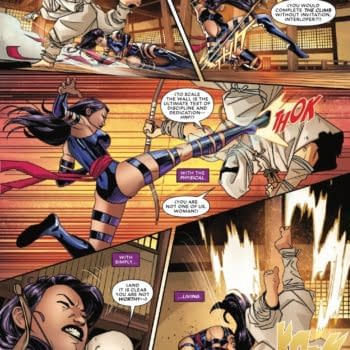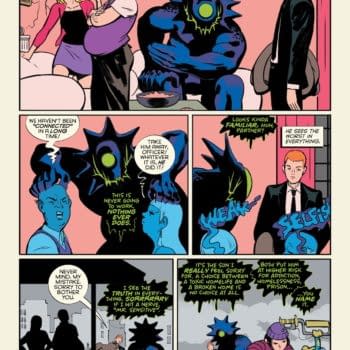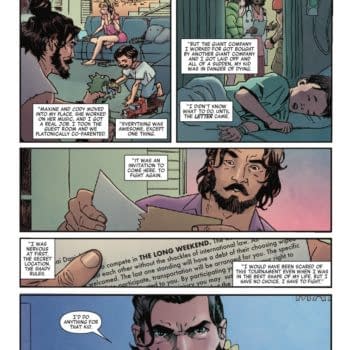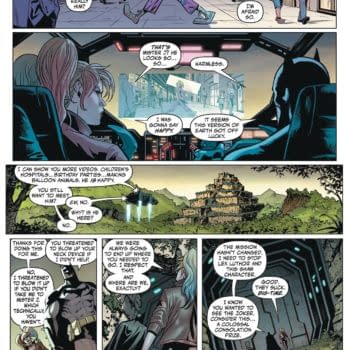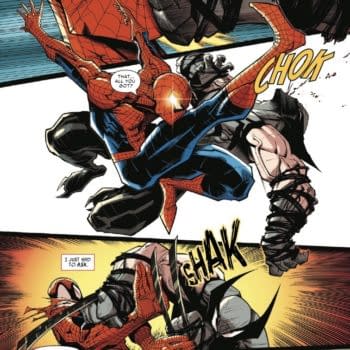Posted in: Comics, Recent Updates | Tagged: Celeste, Comics, graphic novels, H.P. Lovecraft, I.N.J. Culbard, Rob Davis, SelfMade Hero, The Motherless Oven, Thought Bubble 2014
Theme Parks, Teen Worlds, Astronauts And H.P. Lovecraft – New Graphic Novels From Selfmade Hero At Thought Bubble
The New British Graphic Novelists with Selfmade Hero panel at Thought Bubble in Leeds on Sunday, November 16th, started off with a discussion of Ricky Rouse Has A Gun, a new political satire book set in a "knock off Disney theme park in China". Author Jorg Tittel spoke about the difficulties of protected properties and the lack of change in comics since his book draws heavily on the Mickey Mouse tradition. He said that fashion is not protected, so there are new trends every year building on shared ideas. It's different for superheroes, he said, with "new" 20th century material every year, and fewer new things coming out as a consequence."We have the cliché of the Chinese being ripoff artists, but there's an incredible amount of innovation coming out of the East, so I wanted to do this East meets West story that tackles something new", Tittel explained.
John Aggs, the book's artist gave a window on his own process, saying: "In the end papers of the book is my original design for Ricky Rat. There's a tiny design, a Murakami Mickey Mouse that wasn't right for the story. It couldn't move like a real human, and was ungainly. We've all done various villains, and I was looking at what already existed, wondering how close I could get to what already existed and yet make something new. Like with Ratman. Batman is really the logo and the sillouette, and if you change that, it's no longer Batman, so that was difficult".
The audience was shown a trailer for Ricky Rouse Has A Gun, which the panelists described as "more like a music video", and the video amusingly closed with a Disney Store clip, and a bystander saying "looks it's Ricky Rouse" at a Mickey character with his back turned to the viewer.
Rob Davis' The Motherless Oven was the next subject for discussion, and the "bonkers world" Davis has created. Though there is humor and emotion in the story, Davis, who both wrote and drew the book, said it's also about an imaginative landscape and creating "process memory" from his own life, metaphorically. One image shown to the audience, for instance, portrays a rainfall of knives, and Davis drew on this image from the memory of the first girl he kissed. It's "why he's doing all this weird stuff", he said, "not just doing it to be weird". The book is replete with wordplay as well, for instance people having "breakdowns" looking like "giant wrecks".
The police use slingshots in the book, and this "childish device" in the hands of old people is very striking. They are menacing even though they move slowly, and at "just below walking pace" will eventually catch up with you. Scarper, who is somewhat the main character, has very few connections with his parents, and his father eventually disappears, sparking a mystery. There are lions prowling the schoolyard for the central teen characters to cope with, and other features in the book including characters being able to "turn on summer". The students run away from the school, and escape, Davis said, and it's a feeling of "the first day of summer and falling in love" that are a major part of the story.
I.N.J Culbard's Celeste was the next graphic novel to be featured on the panel, which Culbard both wrote and drew. The story takes part in three places in the world and is about "isolation" since people disappear, leaving only a limited number of characters. It's about confronting issues by oneself, Culbard said. When asked how he scripts his comics, Culbard said he leaves description to the bare minimum, and then puts in dialogue. He does full script first, then drawing feels like a second draft. Culbard explained that in the late 1990's, he collapsed and hallucinated a WWII story. He'll never forget that "flash" of seeing the station completely empty, and he considers that the genesis of the story. Astronauts have the "overview" effect, Culbard explained, which is when on their first viewing, they look at the moon, and then at a given point, they turn around and look at the earth, and first realize that it has no borders. He's interested in reflecting the psychology of that, he said. There's a great deal of moon imagery in the graphic novel.
The Dream Quest of Unknown Kadath, Culbard's even more recent book, which landed at Thought Bubble, is a Lovecraft adaptation. Culbard said that as a writer, adapting Lovecraft, means you have hardly any dialogue, but the misconception that Lovecraft doesn't describe things is frustrating, since he does. Lovecraft is known for his "purple prose", Culbard said, but that's not what interests him so much as the story itself. Working with Lovecraft is "rife" for using your imagination, he said.
During audience Q &A, Rob Davis confirmed that after The Motherless Oven graphic novel, which he both wrote and drew, he may continue to do illustration or smaller jobs to make money, but the trajectory he's following is into purely original graphic novels in the future.
Culbard spoke about adaptation as a challenge in visual exposition and "getting rid" of extravagant prose, especially in Lovecraft. Speaking from his experience adapting Don Quixote, Davis also added that "some things just have to change" in the process.
Working with old books, Culbard said, you're also using more modern narrative devices. Davis added that it's "impossible to give someone a faithful experience of the book, so in a sense you are free" as a creator.
When asked about Motherless Oven, Davis said that he wanted, rather than having metaphors "living in the prose" to just have the metaphors "walking" and "trotting about in the real world", which he feels is not that different than "cubism" or more abstract art movements. The great thing about comics, he said, is that you can "put a speech bubble on anything and it talks", whereas in a film, you have to plan things differently to handle the surreal.














